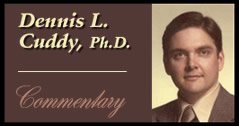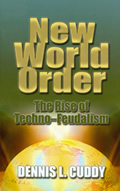A "BOLD NEW WORLD" AND "FORCES TOO POWERFUL"
PART 2
By
Dennis L. Cuddy, Ph.D.
October 3, 2011
NewsWithViews.com
[Note: In the Note at the beginning of Part 1 of this series, I referred to the Power Elite’s (PE) economic timetable for the future. Often, the PE uses crises/chaos to move their plan forward, and on September 7, 2011, Moneynews published “UBS: Euro Can’t Survive, Demise To Spark Chaos” by Forrest Jones, who wrote that according to Zero Hedge, a UBS (Union Bank of Switzerland) report stated: “Under the current structure and with the current membership, the euro does not work. Either the current structure will have to change, or the current membership will have to change…. Were a stronger country such as Germany to leave the euro, the consequences would include corporate default, recapitalization of the banking system and collapse of international trade…. It is also worth observing that almost no modern fiat currency monetary unions have broken up without some form of authoritarian or military government, or civil war.”
Another part of the PE’s plan is to link regional arrangements, and in that regard, on September 13 negotiations began in Chicago regarding the Trans-Pacific Partnership (known as the “NAFTA of the Pacific”). The original members Chile, New Zealand, Singapore and Brunei joined on June 3, 2005; and Australia, VietNam, Malaysia, Peru and the U.S. are now negotiating to join. This will mean an additional loss of jobs for American workers, especially in manufacturing, because nations like Viet Nam have few (if any) labor, health, and environmental regulations as the U.S. does. In the last decade, Michigan has lost almost half of its manufacturing jobs, and North Carolina and Ohio aren’t far behind that. Another reason for the loss of these jobs is that many other countries subsidize their industries. A New York Times article, “Solar Panel Maker Moves Work to China” (January 14, 2011), reported that Evergreen Solar is moving from Massachusetts (800 jobs lost) to China because, as CEO Michael El-Hillow said: “Chinese manufacturers have been able to push prices [for solar panels] down sharply because they receive considerable help from the Chinese government and state-owned banks, and because manufacturing costs are generally lower in China.” And in “Andy Grove: How America Can Create Jobs” (Bloomberg Business Week, July 1, 2010), one reads that former Intel CEO Andy Grove claims that our advanced technology companies are creating many more jobs abroad than in the U.S.]
William Knoke in his book Bold New World mentioned in Part 1 sees clearly the trend today toward world government via regional arrangements, as he comments that “Historians looking back on us today will view regional blocs as mere stepping-stones toward the world as a trading bloc, perhaps one political unit…. It will only be a matter of time before these blocs in turn, merge into a whole…. As each bloc forms, regional trade heightens and the need for a common currency, uniform product labeling, and commercial regulation rises. In each case, we are experimenting with new ways to link countries, to yield sovereignty in exchange for something more than what is lost.”
It was evident even before the end of the Second World War that if a world government were to succeed, there would have to be some sort of enforcement mechanism. In the Chinese Ambassador to the United States Hu Shih’s lecture in A Basis for the Peace to Come, he pronounced: “The new world order which we want to see set up… must be a ‘League to Enforce Peace.’ …This new world order must command a sufficient amount of organized force to support its law and judgment.”
The Secretary-General of the United Nations, U Thant, would see the U.N. in the role of “Enforcer,” as in a May 6, 1962 address at Uppsala University in Sweden, he talked about “the myth of the absolute sovereign state,” stating that “If the United Nations is to grow into a really effective instrument for maintaining the rule of law, the first step must be the willingness of Member states to give up the concept of the absolute sovereign state…. In the community of nations, it is increasingly important to restrict the sovereignty of states, even in a small way to start with. This restriction may involve… the reduction of armed forces and the undertaking to submit disputes to the arbitration of an international judiciary…. The United Nations… must have the right, the power, and the means to keep the peace.” (See volume VI of the Public Papers of the Secretaries-General of the United Nations, made possible by a grant from the Ford Foundation, whose earlier president H. Rowan Gaither told Congressional Committee Research Director Norman Dodd that the foundation was operating under directives from the White House “to the effect that we should make every effort to so alter life in the United States as to make possible a comfortable merger with the Soviet Union.”)
In a later address to the World Association of World Federalists on August 23, 1970 in Ottawa, U Thant indicated “there is no aspect of world affairs and national affairs that does not require the attention of world citizens as they work steadfastly to usher in the new world order.” And the next year (1971), U Thant became one of the founders of Planetary Citizens, along with Norman Cousins who would be president of the World Federalist Association. President Barack Obama has referred to himself as a “citizen of the world.”
Cousins had earlier written in Modern Man is Obsolete (1945) that “the greatest obsolescence of all in the Atomic Age is national sovereignty…. We even debate the question of ‘surrendering’ some of our sovereignty—as though there is still something to surrender. There is nothing left to surrender. There is only something to gain…. A common world sovereignty would mean that no state could act unilaterally in its foreign affairs…. It would mean that no state could withdraw from the central authority as a method of achieving its aims…. There is no need to talk of the difficulties in the way of world government. There is need only to ask whether we can afford to do without it.”
And if the U.N. were to become a de facto world government, how might it govern and who might be the model for its leadership? In a message to a UNESCO symposium in Finland in 1970, U Thant noted that “Lenin was a man with a mind of great clarity and incisiveness, and his ideas have had a profound influence on the course of contemporary history…. [Lenin’s] ideals of peace and peaceful coexistence among states… are in line with the aims of the U.N. Charter.” (See “Lenin Aims Like U.N.’s, Thant Says,” Los Angeles Times, April 7, 1970.)
U Thant was not the only notable to see the “benefits” of the Communist model for world government, as former U.S. Supreme Court Justice William O Douglas in Towards a Global Federalism (1968) wrote that “when the anatomy of that system [Communism] is exposed, say at the level of medicare, scientific research and development, athletics and the arts, technical training, nursery schools, outer space, the regime obviously reflect much that is good from the view point of all humanity…. ‘Building bridges’ with Communist nations is the prime necessity of the day…. We have moved from free enterprise to a sui generis form of socialism. The trend toward the collective society will continue…. The Western and the Soviet regimes may yet evolve into comparable economic systems…. The new [global] federalism would deal with conflicts between nations just as our own Supreme Court deals with conflicts between sovereign states.” This is the type of synthesis I have mentioned many times as the goal of the PE. And Justice Douglas’ 1968 assessment that we had already moved toward a form of socialism has been furthered by President Obama.
Unlike Lenin’s acceptance of violent means to accomplish his ends, the movement today toward a World Socialist Government, synthesizing Western Capitalism and Eastern Communism, is more sophisticated and psychological in its approach. In that regard, Soviet defector Anatoliy Golitsyn in The Perestroika Deception (1995) spelled out how Mikhail Gorbachev had been tricking the West, as Gorbachev and his wife Raisa were the disciples of the late Sardinian Communist Antonio Gramsci, “the Marxist proponent of a policy of active social demoralization” to undermine a country by subverting the culture through a variety of means. Though Gorbachev was responsible for numerous atrocities, he was treated royally when he toured the U.S., even having the use of Steve Forbes’ (presidential candidate at the time) family airplanes.
Relevant to societal change and the movement toward a World Socialist Government, Knoke in his book projected that the Socialist-dominated European Union “is showing us the next step…. What happens in Europe will very much be the model for world consolidation in the twenty-first century, not just economically, but politically and socially as well.” But how would American society be changed to accept this “Grand Design”?
In Raymond Fosdick’s memorial volume on Rockefeller’s General Education Board, he described the Board as part of Rockefeller’s effort toward “this goal of social control.” And in 1945, Rockefeller Foundation Medical Director Alan Gregg was touring various institutions that had been involved in war medicine to see if any group would commit to undertake the kind of social psychiatry that had been developed by the army during wartime (e.g., cultural psychiatry for the analysis of the enemy mentality), and see if it could be relevant for the civilian society.
This led to a Rockefeller grant that resulted in the birth of the Tavistock Institute of Human Relations in London in 1947. Tavistock would join with Kurt Lewin’s Research Center for Group Dynamics at the University of Michigan the next year to begin publication of the international journal, Human Relations, relating theory to practice. In that same year (1947), the Research Center for Group Dynamics along with a division of the National Education Association (NEA) founded the National Training Laboratories (NTL), which in 1962 published Issues in [Human Relations] Training. In this book is described “unfreezing, changing and refreezing” attitudes, and how the NTL has moved toward “sensitivity training” which is characterized as “thought reform or brainwashing.” Some years later (1977) Tavistock senior staff member Fred Emery’s Futures We are In was published, in which was related Emery’s theory of “social turbulence,” which indicates that faced with a series of crises, many individuals will attempt to reduce the tension by adaptation and eventually psychological retreat, which can lead to social disintegration. Tavistock and the NTL have been especially interested in “human resource management” and “group behavior.”
At this point, it is important to look a little more closely at who has been psychologically manipulating the American people as well as many others in the rest of the world. In that regard, Christopher Simpson in Science of Coercion: Communication Research and Psychological Warfare 1945-1960 (Oxford University Press, 1994) wrote: “I first discuss U.S. psychological warfare prior to 1945, stressing the early work of noted communication theorists Harold Lasswell and Walter Lippmann and the pioneer studies underwritten by the Rockefeller Foundation…. Lasswell and Lippman advocated… a particular social order in the United States and the world in which forceful elites necessarily ruled in the interests of their vision of the greater good. U.S.-style consumer democracy was simply a relatively benign system for engineering mass consent for the elite’s authority…. Harold Lasswell had the ear of [Rockefeller] Foundation administrator John Marshall…. The elite of U.S. society (‘those who have money to support research,’ as Lasswell bluntly put it) should systematically manipulate mass sentiment.”
A key agent of such elite was John J. McCloy, Assistant Secretary of War during World War II, who established a highly secret Psychology Branch within the War Department General Staff G-2 (Intelligence) organization (McCloy would go on to become head of the World Bank, on the Board of the Rockefeller Foundation, chairman of the Ford Foundation, and chairman of the Council on Foreign Relations for many years.). Other elite such as William Paley (CBS), C.D. Jackson (Time/Life) and W. Phillips Davison (RAND) were prominent staff members of the U.S. Army’s Psychological Warfare Division during the Second World War. Two other centers of psychological warfare at that time were the Office of War Information (OWI) headed by Rhodes scholar Elmer Davis, and Samuel Stouffer’s Research Branch of the U.S. Army’s Division of Morale.
After the war, Stouffer (Harvard University) became a member of the interservice Committee on Human Resources established by the Department of Defense in 1947. John Clauson, who was a veteran of Stouffer’s Research Branch, wrote in “Research on the American Soldier as a Career Contingency” (Social Psychology Quarterly 47, no. 2, 1984): “Perhaps most intriguing was the number of our members who became foundation executives. Charles Dollard became president of Carnegie Corporation. Donald Young shifted from the presidency of SSRC (Social Science Research Council) to that of Russell Sage… Leland DeVinney went from Harvard to the Rockefeller Foundation. William McPeak… helped to set up the Ford Foundation and became its vice president. W. Parker Mauldin became vice president of the Population Council. The late Lyle Spencer (of Science Research Associates)… endowed a foundation that currently supports a substantial body of social science research.”
Dollard (president of the Carnegie Corporation 1948-1954) and Young (SSRC) urged Stuart Chase (with the League for Industrial Democracy, formerly titled The Intercollegiate Socialist Society) to write The Proper Study of Mankind. The book was initially financed by Carnegie Corporation, was characterized as a project of the SSRC, and was published in Harpers in 1948. In the book, one reads: “Theoretically a society could be completely made over in something like 15 years, the time it takes to inculcate a new culture into a rising crop of youngsters…. Prepare now for a surprising universe: Individual talent is too sporadic and unpredictable to be allowed any important part in the organization of society. Social systems which endure are built on the average person who can be trained to occupy any position adequately if not brilliantly.” Does this not call to mind Pavlov’s conditioning of dogs in the past and Outcome-Based or School-to-Work education today?
And how society would be “made over” by Chase can be seen in his earlier book, A New Deal (Chase originated this term and would be a member of FDR’s “Kitchen Cabinet”), in 1932 in which he proclaimed: “I am not seriously alarmed by the sufferings of the creditor class, the troubles which the church is bound to encounter, the restrictions on certain kinds of freedom which must result, nor even by the bloodshed of the transition period. A better economic order is worth a little bloodshed…. Revolution can give what no other road promises to give so directly and forcibly—a new religion…. It will be materialistic…. We need a new religion…. Red revolution is a creed, dramatic, idealistic and, in the long run, constructive…. A nation (Russia) of 160 million people… has adopted this religion…. Groups are actually beginning to form. As yet they are scattered and amorphous; here a body of engineers, there a body of economic planners. Watch them. They will bear watching. If occasion arises, join them. They are part of what H.G. Wells has called the Open Conspiracy. Why should Russians have all the fun remaking the world?” Chase would be a consultant to UNESCO in 1949.
| Subscribe to the NewsWithViews Daily News Alerts! |
Dollard was not only president of the Carnegie Corporation (and a trustee of RAND), but he was also chairman of the Human Relations panel of the Defense Department’s Committee on Human Resources (paid panel consultants included Lasswell and the Carnegie Corporation’s John Gardner, who would become Secretary of HEW under President Johnson). In Christopher Simpson’s book mentioned above, the author states that “it was the Carnegie executives who controlled the purse strings of the funds on which Stouffer relied.”
� 2011 Dennis Cuddy - All Rights Reserved











 Share
This Article
Share
This Article






